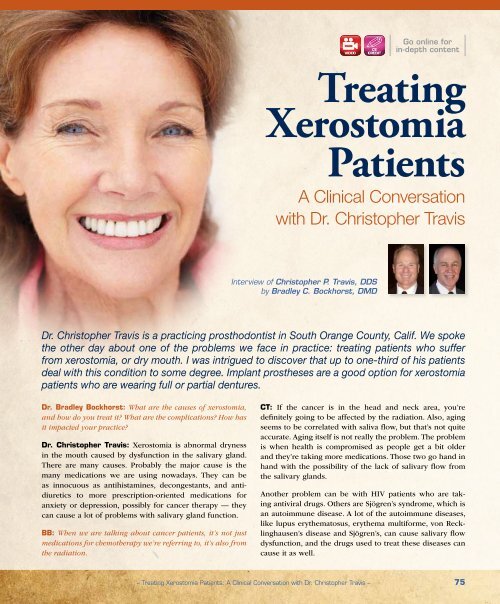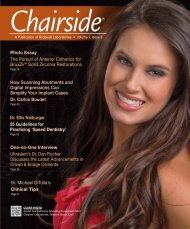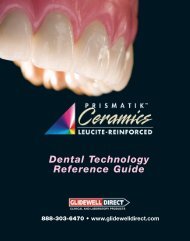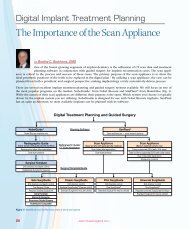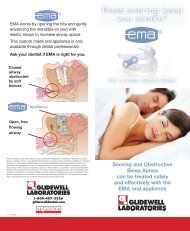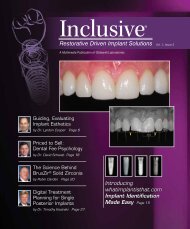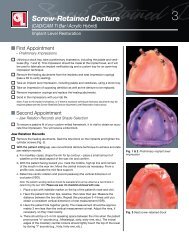PDF Download - Glidewell Dental Labs
PDF Download - Glidewell Dental Labs
PDF Download - Glidewell Dental Labs
You also want an ePaper? Increase the reach of your titles
YUMPU automatically turns print PDFs into web optimized ePapers that Google loves.
Go online for<br />
in-depth content<br />
Treating<br />
Xerostomia<br />
Patients<br />
A Clinical Conversation<br />
with Dr. Christopher Travis<br />
Interview of Christopher P. Travis, DDS<br />
by Bradley C. Bockhorst, DMD<br />
Dr. Christopher Travis is a practicing prosthodontist in South Orange County, Calif. We spoke<br />
the other day about one of the problems we face in practice: treating patients who suffer<br />
from xerostomia, or dry mouth. I was intrigued to discover that up to one-third of his patients<br />
deal with this condition to some degree. Implant prostheses are a good option for xerostomia<br />
patients who are wearing full or partial dentures.<br />
Dr. Bradley Bockhorst: What are the causes of xerostomia,<br />
and how do you treat it? What are the complications? How has<br />
it impacted your practice?<br />
Dr. Christopher Travis: Xerostomia is abnormal dryness<br />
in the mouth caused by dysfunction in the salivary gland.<br />
There are many causes. Probably the major cause is the<br />
many medications we are using nowadays. They can be<br />
as innocuous as antihistamines, decongestants, and antidiuretics<br />
to more prescription-oriented medications for<br />
anxiety or depression, possibly for cancer therapy — they<br />
can cause a lot of problems with salivary gland function.<br />
BB: When we are talking about cancer patients, it’s not just<br />
medications for chemotherapy we’re referring to, it’s also from<br />
the radiation.<br />
CT: If the cancer is in the head and neck area, you’re<br />
definitely going to be affected by the radiation. Also, aging<br />
seems to be correlated with saliva flow, but that’s not quite<br />
accurate. Aging itself is not really the problem. The problem<br />
is when health is compromised as people get a bit older<br />
and they’re taking more medications. Those two go hand in<br />
hand with the possibility of the lack of salivary flow from<br />
the salivary glands.<br />
Another problem can be with HIV patients who are taking<br />
antiviral drugs. Others are Sjögren’s syndrome, which is<br />
an autoimmune disease. A lot of the autoimmune diseases,<br />
like lupus erythematosus, erythema multiforme, von Recklinghausen’s<br />
disease and Sjögren’s, can cause salivary flow<br />
dysfunction, and the drugs used to treat these diseases can<br />
cause it as well.<br />
– Treating Xerostomia Patients: A Clinical Conversation with Dr. Christopher Travis – 75


